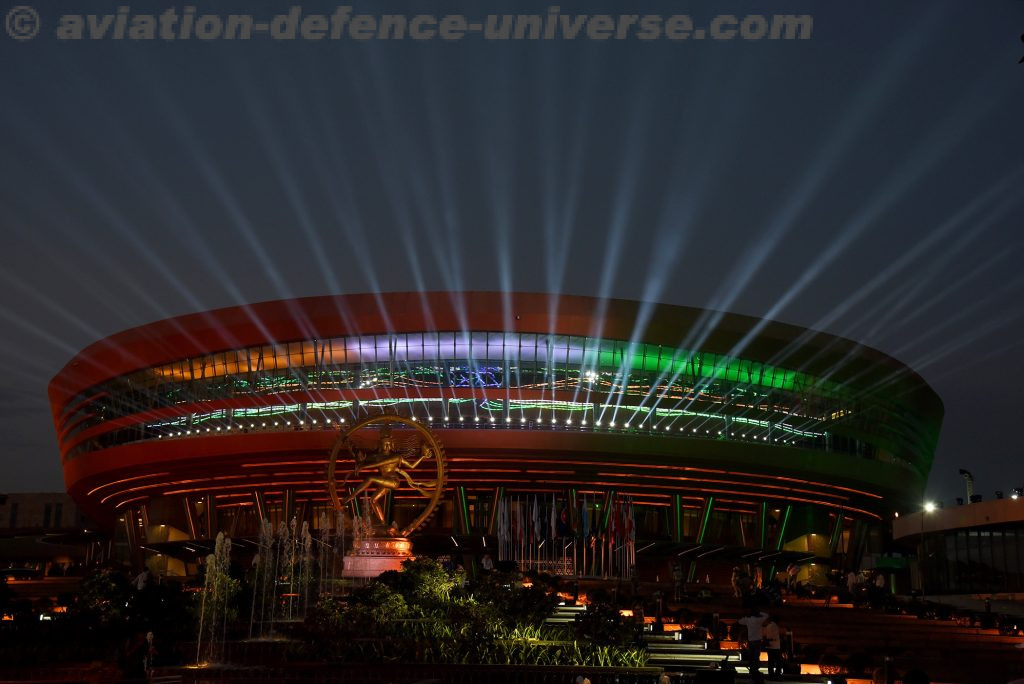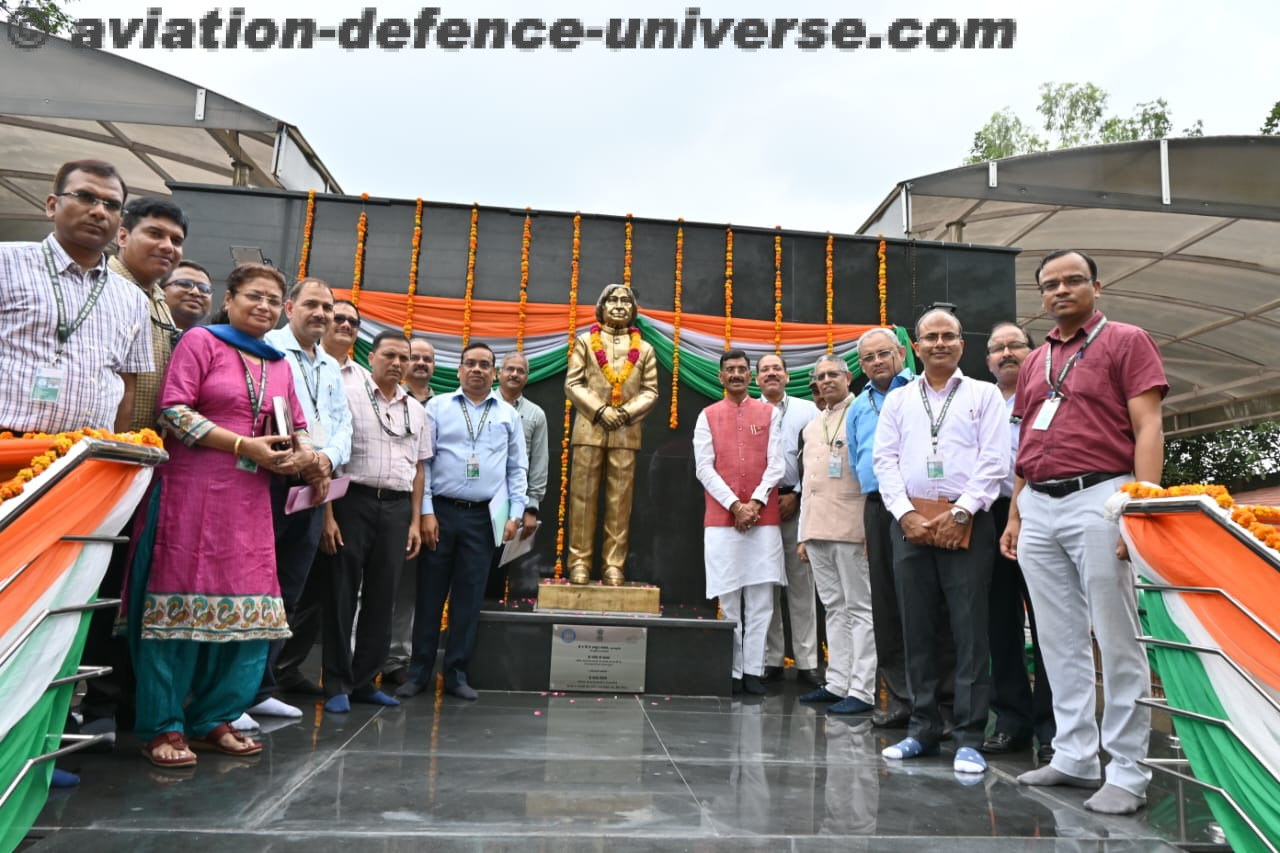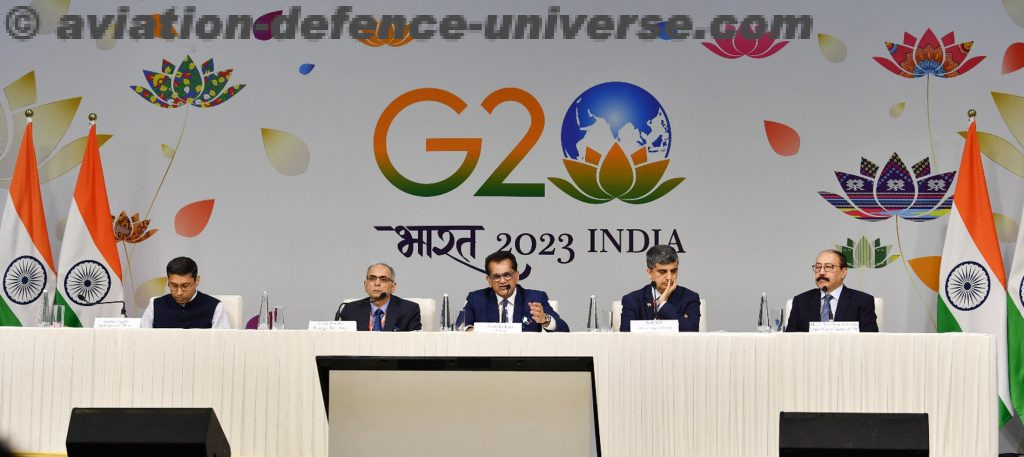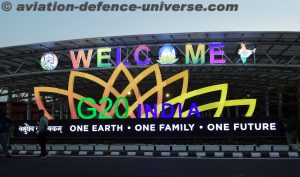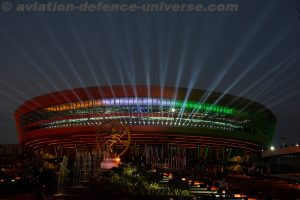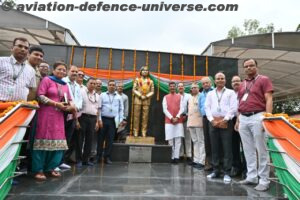Arindam Bagchi, Official Spokesperson: A very good afternoon to all of you. I am Arindam Bagchi, Spokesperson of the Ministry of External Affairs. Welcome to all of you here. Warm welcome to all of you to the opening activities of the International Media Centre here at Bharat Mandapam, Pragati Maidan. We are delighted that there is such a large turnout of media from India and across the world. Your presence here is testimony to that. From tomorrow morning, we have one of the very important activities of the G20 at this G20 summit being hosted by Prime Minister Shri Narendra Modi. To give us a sense of what all is in store and what has been happening so far, we have our proud privilege to have here on the dais, Shri Amitabh Kant, Indian Sherpa. Joining him, Shri Ajay Seth, Secretary (DEA), also the Finance Deputy of the process. Next to him, Shri Harsh Vardhan Shringla, Chief Coordinator of the G20 and on my left, Shri Vinay Kwatra, Foreign Secretary. I would request them to make brief opening remarks, after which we will open the floor. Sir, if I could hand over the floor to you, Sir.
Amitabh Kant, G20 Sherpa: Thank you, Arindam. When India took over the presidency of G20 in Indonesia at Bali, we were in the midst of a scenario of slowing growth and productivity worldwide. There was a huge impact of COVID-19 pandemic which had led to vast segments of the global population going below the poverty line. Vast number of people had lost their jobs. There was a cost of living debt crisis. There had been a reversal on the sustainable development goals. There was a challenge of climate crisis and climate action. At that point, India felt that we should start our presidency with the theme of “Vasudhaiva Kutumbakam”, that is the world is one family. We are one earth, one family, and we should have one future. And the Prime Minister who is the leader of G20 from India and I act as his Sherpa, he said that our presidency, India’s presidency should actually be inclusive, it should be ambitious, it should be decisive, and it should be action-oriented. And these are the four principles on which we have worked. And I can assure you that we have lived up to his vision of being inclusive, ambitious, action-oriented, and very, very decisive during our presidency.
During this presidency, we had some broad priorities with which we started. And these priorities were very critical for the global world, first of which, that at a point of time when one-third of the world is facing a recession, we should drive bold, sustainable, strong, and inclusive growth. The second key priority for us was to have accelerated sustainable development goals because only 12 of the 169 SDGs are on track and we were way behind the schedule. We were midway at the 2030 action point, but we are way behind and therefore accelerating the SDGs, improving learning outcomes, health outcomes, nutrition, all these were very critical for India’s presidency. Thirdly, we wanted the world to take the lead on green development in the context of climate action and climate finance, and there were several components of this which we wanted to drive, and therefore green development, climate action, climate finance was our third priority. And because both SDGs and climate action require finance, particularly for developing and emerging markets in the Global South, it was critical that we focus on multilateral institutions of the 21st century, how to redesign and reform them, and our view was that Global South, developing countries, emerging markets, which has been a very, very key component of India’s presidency, must be able to get long-term financing and must be able to use new instruments for financing to drive both SDGs and climate finance. So the fifth priority of India’s presidency was that we must have technological development and digital public infrastructure, because if we have to lift vast segments of the population, if we have to make a difference to the Global South, technology will be the key driver. And most of the innovations in the world have come from the big tech in the west, and even in China they’ve come from big tech, but India has created a very unique model of digital public infrastructure, which is open source, open API; is interoperable, and has enabled digital identity for every citizen, has enabled bank account for every citizen, has enabled everyone to do fast payments, has enabled everyone to improve learning outcomes and health outcomes. And during the COVID, we were able to do 2.2 billion COVID vaccinations; and therefore technological development and how to use digital public infrastructure to drive growth, when 4 billion people of the world do not have digital identity, about 3 billion people do not have bank accounts, and over 133 countries do not have fast payments, that was critical from India’s priorities perspective. And the last key priority, which the Prime Minister elucidated, and which he felt very strongly about, was women-led development, to bring women-led development, to bring women empowerment and gender equality. So these have been the six key priorities of India on which we have worked.
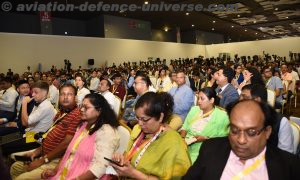
We started our presidency by, on which the Foreign Secretary will talk about, with a meeting of the Voice of the Global South. We got the perspective of 125 leaders, and then we remain focused on the perspective of the Global South and the requirements of the developing countries. And the New Delhi Leaders’ Declaration, which many of you will see post the Summit, you will see it as a voice of the Global South and the developing countries. No document in the world would have such a strong voice for the Global South and the developing countries as the New Delhi Leaders’ Declaration. And therefore the Prime Minister’s vision of India’s G20 presidency being a very inclusive presidency has been our aim. There’s been a huge scale and reach of India’s presidency. There have been 19 G20 countries and the EU, that means 20; 9 special invitee countries. There have been three regional organizations. There have been 11 international organizations who participated in all the 220 meetings that took place in India. We were able to use this opportunity to take the meeting to over 60 cities of India and every state and every Union Territory of India, and use this opportunity to demonstrate the liveliness, the vibrancy, and the dynamism of India’s federal polity. Every state vigorously participated, and we were able to translate and bring a huge transformation to the city infrastructure in 60 cities. When G20s are held across other countries, they are held in the capital or maximum two cities. In India’s case, we’ve held them over 60 cities of India and used this as an opportunity to transform them.
So, ladies and gentlemen, we’ve had over, a vast, the biggest participation in G20 from across the world. We have had Africa’s highest ever participation in addition to the 29 countries, we have had 32 additional countries. We’ve been the voice of the Global South. During this period, we’ve used this opportunity also to push a huge amount of Indian narrative through One District, One Product, that is every district which has come out with a product, focused; that was the only gift we gave to all the visitors who came during our presidency so that we could have an impact on the lives of our artisans. We have focused on millets, which is critical from the viewpoint of sustainability of agriculture. We have focused on achievements of India as a mother of democracy, focused on the digital transformation and digital public infrastructure.
So, with these few words, ladies and gentlemen, I can assure you that our presidency has been inclusive, decisive and action-oriented. Our New Delhi Leaders’ Declaration is almost ready. I would not like to dwell on it because this declaration will be recommended to the leaders and the leaders will then accept it and only after it has been accepted by the leaders, we will be able to talk about the actual achievements of this declaration. With these few words, I’ll conclude. Thank you very much.
Arindam Bagchi, Official Spokesperson: Thank you very much, Sir. May I now hand over the floor to Shri Ajay Seth, Secretary (DEA), Sir.
Ajay Seth, Secretary (DEA): Good afternoon to all. Let me share some of the priorities which the finance-related work handled during the course of the presidency. Under the leadership of our Prime Minister Shri Narendra Modi, the focus and the vision of India’s G20 presidency has been to bring focus to the global discourse, issues which make a difference to people’s lives, lead to actionable, decidable, sustainable and inclusive growth and empower the global growth. Keeping that vision in mind, the priorities which were set and endorsed by finance ministers and governors in February in their first meeting in Bengaluru, some of them were: how to strengthen multilateral development banks for challenges of 21st century. Similar manner, how to support strong, sustainable, balanced and inclusive growth in the midst of the current challenges which the world is facing. In the same way, how to manage the debt vulnerabilities which several countries are facing. Yet another priority was that how the technology can be used for financial inclusion, for productivity gains, for efficiency, for private sector. Similarly, how the new potentials of technology such as blockchain or crypto can be beneficial and yet how to build a policy discourse, the policy approaches and what set of regulation building consensus around that. So these were some of the priorities and during the course of the year, in more than 25 meetings of various working groups, ministers, deputies, these have been deliberated with very intense effort and one unique feature of the work has been…I’ll put it rather two big elements, two big differences. One was to go beyond the structured meetings and arrange almost 40 seminars, side events, symposiums, inviting domestic as well as global experts and generating very intense discussion to find a robust way forward. In a similar way, how to generate the local connect, Jan Bhagidari, almost 40 events were done on issues which are relevant to people’s lives. Based on these deliberations over the course of the year, these recommendations have now been placed for consideration of the leaders. They would be discussing it over the course of next two days and then we will have definite outcomes and we will all share with you. Thank you.
Arindam Bagchi, Official Spokesperson: Thank you very much Sir. May I request Shri Harsh Vardhan Shringla, Chief Coordinator Sir.
Harshvardhan Shringla, Chief Coordinator (G20): Namaskar and good afternoon. The focus of today’s press conference is on the G20 New Delhi Summit but since many of our media friends have joined us only today, I’ll briefly begin by taking you through our presidency journey. As you know, we assumed the presidency of the G20 on the 1st of December last year and we will conclude our presidency on the 30th of November this year. During the course of our presidency, we would have hosted over 220 G20 meetings in 60 different cities across the length and breadth of our country. In keeping with the Prime Minister’s vision of a pan-Indian G20, we have hosted at least one G20 meeting in every state and union territory of India. And from…to my mind, that is the finest example of cooperative federalism that we can see. Now, the effort has been, of course, to take the G20 down to the grassroots level through a process that we call Jan Bhagidari which is a people’s participation movement and whether it is to the G20 University Connect or the G20 Model School or quiz, essay and painting competitions and festivals, the G20 has been popularized and taken down to the grassroots levels in our country. We have also looked at the G20 as an opportunity to highlight and showcase India’s rich cultural heritage and diversity and our tourism potential and in that context, we have hosted over 300 cultural events with the participation of over 18,000 of our cultural artists and experts. Of course, we have also made our presidency an inclusive one. Sherpa has already mentioned that we have had very significant participation from the Global South and from Africa. We would have received a total of about 100,000 visitors for our G20 presidency from over 125 nationalities and for many of them, this has been the discovery of a new India and I think that has been very significant from their point of view. Clearly, the G20 presidency will bring economic benefits to our country and to our citizens and that’s also been a very important objective.
Now, when you organize such a huge exercise, an unprecedented and uniquely Indian presidency, you do need an organizational base and we have started on the organization and planning of the G20 as early as the beginning of last year, one and a half years before today’s eve of the Summit. We have set up the G20 secretariat. In this process, it has been a whole of government approach and a whole of nation approach, and every single Indian citizen has been involved in that effort and it’s very important to note that about 15 million of our citizens have been directly involved in the participation of some G20 event or the other across our country. So in that organizational endeavor, we’ve had guidance from the Prime Minister himself, from cabinet ministers. There is a coordination committee which has been set up under the Principal Secretary to the Prime Minister which includes the NSA, which includes Cabinet Secretary, senior secretaries, Sherpa and all of us here and this committee has been meeting regularly. It’s met at least nine times formally but many times informally and has provided extensive guidance on every aspect and overseen every aspect of the presidency’s organization and management. So, I think that was important.
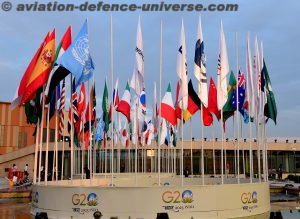
Now, on the Summit itself, of course, the Foreign Secretary and Sherpa will take you through the program elements but it’s important for you to know what else is there and what are the activities and exhibitions and other events which are within the Bharat Mandapam, within the G20 Summit complex. Of course, the media center is one that you have seen. Both halls 4 and 5 have been earmarked for the Media Center. We expect to host between two and three thousand international and domestic media here. It would be a state-of-the-art media center with over 1,300 workstations, high-speed internet and Additional Secretary (XP) would have communicated to you the other aspects of this Media Center. There is an emphasis on the cultural aspects of our presidency as well. There is a very unique exhibition which is called the cultural corridor which will be on display at the convention center. This involves the display of cultural artifacts and objects from different countries, both tangible and intangible heritage but also natural heritage. So this has some very, very interesting exhibits which the details of which will be available with you. We also have an immersive display which has again some of the best illustrations of every country that is a part of our G20 presidency and all of this again is at the Convention Center. There’s a democracy cube which is also there and what we will certainly do is that we’ll make this available, we’ll make this open to the media and the public after we finish the immediate Summit and this would be a very interesting exhibition to see. Besides that we have the Mother of Democracy Exhibition. India; the largest democracy, vibrant democracy over the ages; has arranged an exhibition which would be essentially narrating the 7,000 year tradition of democracy in our country from the ancient to the modern. There will be 26 interactive panels which should be available in all of the G20 languages. There are apparently 16 languages in which this will be available. There is also a bronze replica of a girl from the Sindhu Saraswati era, 2500 to 3500 years before and this is a very unique part of the exhibition, at the center of the exhibition and there will also be someone who will greet everybody. Its artificial intelligence driven so it’s a technology oriented platform and of course the person who will greet will also provide an introduction to India’s age-old democratic traditions in their respective languages.
You are also aware that we will have, at the time of the dinner that will be hosted tomorrow by our President; there will be a musical ensemble which will play in the background. This of course will represent again musicians from all parts of our country, but it will also include musical traditions of every nature, whether it’s Hindustani, Karnataki, folk, bhajans. Every aspect of music in our country will be covered by the 77 musicians who would also include young students, people who have some disabilities, but also people who are from different walks of life across our country. They will also be displaying some very rare musical instruments which are hardly ever seen or played in our country, but this is something that is an opportunity for us to see so many rare instruments coming together in this particular area. Now, there will be a strong emphasis on technology, especially technology that is linked to digital public infrastructure. And in that context, we will have a few exhibitions at the media center. If you enter the foyer of the media center, you will see a display by our Ministry of Information Technology, which is basically a Digital India Experience Zone, which will have the display of all of the mobile apps and the platforms under which we have arranged to deliver development to the grassroots levels in India, right from Aadhaar to UPI, and this entire India stack will be available. And if any of you do fall sick or have any medical issues, please ensure that you go and connect with eSanjeevani, a digital platform that will have a doctor advise you immediately on the spot. Similarly, we have a Reserve Bank of India Innovation Hub, which is again in the Media Center, and this Innovation Hub will display technologies that FinTech, which has not yet been introduced to the public domain, these are still in the pilot stages, one of them is the Central Bank Digital Currency, through which even international media who are here, who don’t have bank accounts in India, will be able to get some money in their mobile wallets and will be able to use that digitally to buy products in our Crafts Mela, which will be in the adjoining hall, hall number 3. And this Crafts Mela will also, each stall of the Crafts Mela, which represents a different state or union territory of India, displaying, as Sherpa mentioned, the ODOP products and geographical indicator products, will have a QR code compatible with your mobile wallet, the digital currency, and with the UPI. We will also have a frictionless credit display, which basically again is a cutting edge technology under which any credit to be given, say to our farmers, the information relating to that would be immediately available on your mobile phone or your iPad, from the land records to your Aadhaar, to your previous credit history, and this will enable credit to be given within a few minutes of time with each of the farmers.
And so from that point of view, I think we also have, I hope all of you have downloaded our digital app, the G20 India digital app, which is again a state of the art app, which enables you to get this in any language in the G20. You can get it in Portuguese, in German, in Japanese. And this will also enable you to talk to anybody who doesn’t understand your language, say from Hindi to Japanese or from Portuguese to German, it will be instant conversation through the app. You can navigate from one part of the Bharat Mandapam to any other part of this complex. It will enable you to get there without a problem. And any information that you may need on our presidency, on the G20, on India, UPI, any aspects of this is available. And of course, if you feel like a yoga break, that’s also there on our app. So I’ll stop here. I’m sure there are many other things.
Arindam Bagchi, Official Spokesperson: Thank you very much, Sir. May I hand over to Foreign Secretary Shri Vinay Kwatra.
Vinay Kwatra, Foreign Secretary: Thank you very much and good afternoon to friends from the media, both domestic and international. I have six brief points to make, besides what has already been shared by my colleagues, senior colleagues, Sherpa, Chief Coordinator and Secretary (Department of Economic Affairs). Point number first, if you really want to get a sense of India’s vision, priorities and approach to the G20 presidency, I would encourage all of you to read the op-ed that the Honorable Prime Minister of India has written yesterday. It captures a distilled sense of how India envisions and looks at the ongoing G20 presidency of India. Two, the coming together of the 41 Heads of Delegations, Heads of State, Government, Heads of International Organizations in India starting yesterday; under Prime Minister’s personal leadership and direction, it is essentially a celebration of the coming together of the G20 family. And as our Sherpa mentioned earlier, it’s the largest ever participation of the Global South in India.
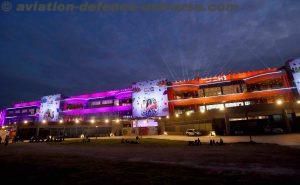
Three, whether it concerns India’s national priorities with regard to G20 or the priorities of G20 countries as a collective, as also the concerns and interests of the Global South; the specifics of the agenda which the Sherpa and the Department of Economic Affairs Secretary mentioned, they have been structured in a most inclusive and the harmonious concepts of One Earth, One Family, One Future. Four, very briefly with regard to the program of the G20 Summit, the Summit’s official conference program is structured around two sessions, first one, ‘One Earth’ starting tomorrow morning, ‘One Family’ tomorrow afternoon, and ‘One Future’ in the morning of the 10th. Besides three sessions of the conference, there would also be a couple of sideline events which are currently being structured involving India and other Heads of State who are visiting us here. Third, a dinner by the Honorable President of India tomorrow, fourth, a visit to Rajghat to pay homage to Mahatma Gandhi, and fifth, a Spouses program. These would be the broad five elements of the Summit. And the last fifth point which I wanted to make, Honorable Prime Minister of India will also be hosting several sideline bilateral meetings during the course of the G20 Summit with the visiting Heads of State/Governments and the other leaders who are going to be in Delhi, as I said, starting yesterday till the departure over 10th and 11th. I would stop here and see if we have any questions on this.
Arindam Bagchi, Official Spokesperson: Thank you very much, sir. May I lay the ground rules before I open the floor. Please introduce yourselves and the organization you represent. We will take questions in a group because we don’t have time.
Manish Jha: This is Manish Jha from TV9, Amitabh Ji, Foreign Secretary and Chief Coordinator. I must tell you first of all that the arrangement at International Media Center are really excellent. I have attended four summits before this Summit and I can tell very proudly that this arrangement is really best. So, thank you so much. So, my question I would like to ask in Hindi.
Amitabh Ji, lagatar aap log joint declaration ko lekar lage hue the, bahot mehnat kar rahe the, aapne hint bhi kiya hain ki joint declaration aayega aur bahot alag tarike se bahot khas hoga. Lekin khabrain ye bhi aa rahe thi ki china ki taraf se har meeting mai, joint declaration mai koi consensus na ho iske liye koshish ki ja rahi thi, kabhi “Vasudhaiva Kutumbakam” ke naam par, kabhi language sanskrit mai kyu hain, toh kis tarah ye journey rahi agar aap ye share kar sake, kyuki har journalist yahi puch raha hain joint declaration aayega ya nahi aayega, agar aayega toh kaise aayega?
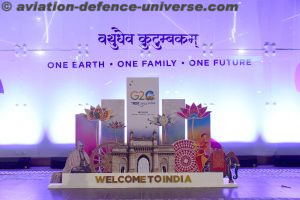
[Question in Hindi: Approximate translation] Amitabh Ji, you were continuously focused on the joint declaration, putting in a lot of effort. You also hinted that the joint declaration would be issued and it would be very special and unique. However, there were reports that there were efforts from the Chinese side in every meeting to ensure that there was no consensus in the Joint Declaration. Sometimes it was regarding the name “Vasudhaiva Kutumbakam,” and sometimes that why it is in Sanskrit language. Could you please share how this journey has been, because every journalist is asking whether the joint declaration will come or not, and if it does, how it will come about?
Yeshi Seli: Sir, this is Yeshi Seli from the New Indian Express. I would like to know who is representing the African Union for this summit? And the G20 officially going to be called G21 after the conclusion of this Summit?
Sidhant: Hi sir, I am Sidhant from WION. My question is do you think the absence of the Chinese President impacts the Summit’s proceedings? Is it and attempt by the Chinese to undermine, do you see it in that way as well?
Samira Hussain: Samira Hussain with the BBC. I am wondering if you think that the Ukraine will derail talks and the ability to come up with the joint statement?
Arindam Bagchi, Official Spokesperson: I will repeat the question, none of you pretty audible…will Ukraine derail the talks and the ability to come up with the joint statement, thats what I heard?
Samira Hussain: Will Ukraine derail the talks?
Nayanima Basu: Hi this is Nayanima Basu from ABP Live. Just one question, on the Russia-Ukraine war, will there be specific discussion on the Black Grain Initiative? Thank you so much.
Amitabh Kant, G20 Sherpa: So let me first say that on the journey of the Joint Declaration, I would prefer to speak after the Summit is over, because the journey has just started, it’s not ended. So I think you should have a little bit of patience, we will give you a complete glimpse of what the journey has been after the Summit gets over. Because you know, this is a Leaders’ Summit, I am only the Sherpa of my leader, who is the Prime Minister of India, so the recommendations of the Sherpas are made to their respective leaders, the leaders have to accept those recommendations and approve them. Once they are approved, then that will get into public domain, and we’ll be able to talk about it. Some of the other questions also related to the content of the Leaders’ declaration, and I would request all of you to realize the high nature of confidentiality of the Leaders’ declaration, because it has to be placed before the leaders, and they have to approve it. But after that, we will be very happy to explain, elucidate, and take you into all the details of that Leaders’ declaration.
As far as AU is concerned, let me say that the Prime Minister, who’s a great believer in Global South, had written to all the leaders, and there has been a very positive response, but formally, that’ll come before the Summit.
Thirdly, on the Chinese, I would really like to say that China is a multilateral player. In multilateral discussions, the issues are very different from bilateral issues, and Chinese discuss issues of growth, development from their perspective. The challenge about any multilateral discussion is that you have to bring consensus across every issue. Every country has a veto power, and therefore, we have to bring everybody on board, and I must say that we have been able to work with every single country, every single country, and bring them on board, which you will later see.
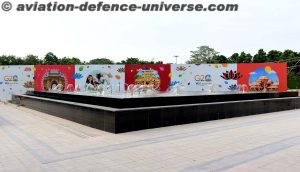
There was an issue about Russia-Ukraine conflict. Let me say that G20 is an economic forum. It discusses issues of growth and development. However, last year in Bali, there was a feeling that issues of conflict and war have an impact on growth and development. So food, fuel, and fertilizer get impacted, and therefore, that issue was discussed, and this year also, as a consequence of the challenge of growth and development and implementation of SDGs, that issue has been discussed at great length and we will talk about it once the Leaders’ Summit is over. Because whatever we discuss will have to be first discussed by the leaders and they will have to take a formal decision on that and then after that has been decided I will be free to speak to you at great length on this issue.
Arindam Bagchi, Official Spokesperson: Foreign Secretary sir, would you like to say anything on these issues?
Vinay Kwatra, Foreign Secretary: Nothing much to add except to the questions which was asked with regard to the presence or absence of leaders. I think External Affairs Minister of India has already spoken on that issue and I think that statement stands for itself. Thank you.
Shri Arindam Bagchi, Official Spokesperson: I’ll open the floor for the next round of questions. I saw a hand here.
Mukesh Kaushik: Sir this is Mukesh Kaushik from Dainik Bhaskar. Foreign Secretary Sir, for the first time China, Chinese President is not taking part in G20. Have they provided any reason for his skipping this Summit and do you think that his absence is playing a spoiler, as Jack Sullivan put it?
Runjhun Sharma: Runjhun Sharma, India correspondent for RT Russia Today. My question is for Mr. Kant. How would you say the response rather negotiations are going for the inclusion of African Union into the block? Also how do you think…
Arindam Bagchi, Official Spokesperson: We will limit ourselves to one question, sorry, just don’t have time.
Saurabh Shukla: Hi, good afternoon everyone, this is Saurabh Shukla, I am Editor-in-Chief of NewsMobile. This G20 presidency is also about India’s solutions for the biggest challenges that the world faces today. What are the three big takeaways that you expect from the Leaders’ Summit?
Pranay Upadhyay: Sir this is Pranay Upadhyay from Zee News and my question is to Sherpa Amitabh Kant Ji. India has been long pushing for the MDBs like multilateral development bank reforms and after the joint finance and the Sherpa track meeting, what is the takeaway, is there a consensus emerging for the multilateral development bank reform and how far we are to onset the process after the Delhi Summit?
Shrikant Bhatia: Mera sawal hain Amitabh Kant ji se, main Shrikant Bhatia hoon Samwad Sindhi newspaper hai. Sir jo bharat ki chhavi videsh mai hai kya is chhavi ka awlokan karne ke liye hamare kuch rastra adhaksh on the spot jayenge, kuch gaon mai, kuch cities mai dekhne ke liye?
[Question in Hindi: Approximate translation] My question is for Mr. Amitabh Kant. I am Shrikant Bhatia from Samwad Sindhi newspaper. Sir, to assess the image of India abroad, will some of Heads of State visit on the spot, some villages, and some cities to observe?
Arindam Bagchi, Official Spokesperson: Kaun leaders ki baat kar rahe hain?
[Question in Hindi: Approximate translation] You are talking about the leaders?
Shrikant Bhatia: Ji sir, leaders.
Ashok Raj: Hi, sir. My name is Ashok Raj from ANI. I have a question regarding to this event. My question addressed to Mr. Shringla Ji, that how do we coordinate such massive effort and what were the organizational structure changes?
Ajay Seth, Secretary (DEA): Some of you asked that what are the three key big takeaways from the Summit. My request to all of you would be that please bear with us for another two days. Once the leaders consider the recommendations made by their ministers, governors and give their decision, that would be the time to take a stock. That what have been the big takeaways, as far as MDB reforms are concerned, both on strengthening multilateral development banks as well as other institutions, strengthening them like IMF, there has been a very rich and intense discussion and we are highly hopeful that the discourse over the past nine months will get a positive consideration from the leaders. Thank you.
Vinay Kwatra, Foreign Secretary: Okay. Thank you. I have already responded to the question on the presence or absence of certain leaders from the Summit and I mentioned that External Affairs Minister of India has already responded to that question. Having said that, let me also mention, it’s a question of which frame of reference do you look at when you look at the priorities, interests, concerns expressed in the G20, both of G20 countries as a collective but also of those countries that are outside the G20 but their interests, concerns and priorities are impacted upon what decisions get taken in the proceedings of the G20. We are welcoming, as I mentioned, Heads of 41 delegations, Heads of States, Heads of Government, Heads of International Organizations in Delhi since 7th for the coming two days and our focus is, as Sherpa said earlier, to drive a consensus on priorities of the G20, how to structure in the priorities and interests of the Global South into the G20 discussions and how to bring together the leaders of the G20 and the leaders of the invited guest countries around that particular agenda. That is the theme, that is the objective that we are focused on and we are very happy that by and large there is a strong effort by all the countries, all the delegations present to move towards a consensus. With regard to the African Union, Sherpa sir has already said that honorable Prime Minister wrote a letter to all countries of the G20 proposing that African Union be included as a full member of the G20. We expect that the Summit proceedings starting tomorrow morning would take a suitable decision on that.
Shrikant ji jo aapka prashna tha videshi chhavi ka, G20 summit ka jo program hai woh kevel Delhi tak hi simit hai filhaal.
[Answer in Hindi: Approximate translation] Shrikant ji, regarding your question about the image abroad, the G20 Summit’s program is currently limited to Delhi only.
Harshvardhan Shringla, Chief Coordinator: I think Raj ji had asked this question about G20 being involving a massive effort and the organizational aspects behind it and I did in my opening remarks say, that it was not only a whole of government effort but a whole of nation effort, because it is not only a huge exercise but it is also an unprecedented exercise. We have never been president of the G20 before. This is also one of the most significant events we have…international events we have ever organized and I think every Indian citizen in a certain sense is a stakeholder in this exercise because the pride he feels of India hosting an event of this scale and magnitude with such level of success. So it certainly has been an organizational effort that has gone across the country. But one aspect I think I will just flag an additionality which I want to put across is that it has involved also an equal, let’s say, collaboration and cooperation with every state and union territory in our country because we have taken it down to the grassroots levels and every state has seen this as an opportunity to promote the state’s tourism potential, recount its own developmental achievements, utilize the platform to highlight what every state in its own case has done. So from that aspect, as I said, it’s a very fine example of cooperative federalism and it has involved a level of cooperation that has gone from the central government to the states, to the municipalities, to the districts and down to the grassroots levels. So I think if you have…look at the success of this presidency, it is guided at the highest levels but it has also involved every citizen of our country.
Amitabh Kant, G20 Sherpa: I think Saurabh asked that question about the three key takeaways of what… well, let me tell you that India has tried to build a huge India narrative to the G20. You will see this in the New Delhi Leaders’ Declaration, whether India has been the voice of the Global South, whether India has been the spokesperson of the developing countries, whether we brought in the huge amount of technological development that India has done through the digital public infrastructure. But I would suggest that it’s not just three but there are an enormous number of lessons which come out of it but you will have to wait for the Leaders’ Declaration to emerge and you will then realize that it’s… that India will leave a huge imprint.
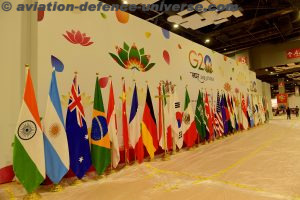
Arindam Bagchi, Official Spokesperson: Thank you Sir. Tripti, yeah go ahead.
Tripti Lahiri: Tripti Lahiri from The Wall Street Journal. Hi. My question is about…so in addition to China and Russia’s leadership not being here, we’ve also seen them coordinating at other forums, you know, be that BRICS or elsewhere that India is also part of. You know, do we see that there is a bifurcation, China-Russia on the one side coordinating more and does that mean that the space for broad-based multilateral cooperation is shrinking?
Neeraj: Sir Neeraj hoon News18 India se, hamara sawal Amitabh sir aur Vinay sir se hain. Sawal ye hain ke pichli bar videsh mantriyon ki G20 baithak ke baad ye bayan aaya tha videsh mantri ki taraf se ke hum log safal nahi ho paye ki Ukraine ke masle par sehmati bane aur unka ishara Russia aur China ki taraf se tha, kyu ki unhone apna paksh badla tha Bali declaration ke baad. Sawal ye hain ke dono deshon ke rastra pramukho ki gairmoujudagi mai kya bharat success kar paya hain ki Ukraine ke masle pe sehmati bana paya hain ya nahi, ya Ukraine ko hata diya gaya hain joint communiqué se?
[Question in Hindi: Approximate translation] I am Neeraj from News18 India, and my question is for Mr. Amitabh and Mr. Vinay. The question is that after the last G20 meeting of Foreign Ministers, there was a statement from the External Affairs Minister that they were not able to reach an agreement on the issue of Ukraine, and his indication was towards Russia and China because they changed their stance after the Bali declaration. The question is, in the absence of both leaders from these two countries, has India succeeded in reaching an agreement on the issue of Ukraine or has Ukraine been removed from the Joint Communiqué?
Sridhar: Good afternoon sir, this is Shridhar from Asian Age. Sir, you mentioned that the New Delhi Declaration is almost ready. Are we to assume that the consensus has been achieved on all issues and will there be a separate Chair’s summary which will be issued at the end of the Summit along with the Joint Communiqué? Will there be a separate Chair’s Summary? Thank you.
Vishnu Som: Good afternoon, Vishnu Som from NDTV. There’s a World Bank report which has come out which has praised India’s digital public infrastructure. I’m just trying to understand how is India going to disseminate this infrastructure? Will it be through an organization or an institution like the Solar Alliance?
Xenia: Thank you so much. Xenia, RT.com. A question is, since we discussed the global growth, has the issue of developed countries imposing unilateral sanctions been discussed or the responsibility for imposing such sanctions which affects, you know, the global growth and especially the undeveloped countries. Has this been discussed as well and will this figure in the Communiqué probably?
Speaker: Reporter from Shanghai Media Group. You mentioned that all participants show common interest in Global South but I do believe there are different concerns between the Global South and the developed countries. So how India presidency will show its decisiveness in this? Thank you.
Rishabh: Sir this is Rishabh from Times Now. So just last week the Russian Ambassador said that Indian negotiating team was under immense pressure and there were teams that were trying to hijack the whole negotiation. If you can shed some light on that, how difficult it was during the negotiating time to come to a Joint Declaration if that is possible a day after?
Vinay Kwatra, Foreign Secretary: I think to the first question, which is sort of more of an interpretative frame of what is happening to the multilateralism and the related space globally, I think we would rather focus on what are the priorities in the G20, of the G20 countries, and in that what is the priorities that India stands for and the rest of the Global South stands for. I think the space that we come from is…our belief is that multilateralism needs to be reinvigorated; it needs to be inclusive, and it also needs to be an important center and a medium for global governance, which has to be more representative, naturally effective, transparent, and accountable. We have brought up these points strongly in the discussions in various meetings of the G20, including in particular the G20 Foreign Ministers’ meeting, and we will see how that finds reflection in the Communiqué that is being negotiated.
Neeraj jo aapka prashna tha, dekhiye, main ismai sirf itna hi kehna chahunga ki, bharat ki pradhanmantri Modi ki adhyakshyat mai yahi apeskha hain ke G20 ke sabhi sadasya desh milkar ek consensus ki taraf agrasar honge, agrasar hain aur G20 summit ke samapti ke uprant hum ye apesksha rakhte hain, abhilasha rakhte hain ke ek consensus ke madhyam ke dwara communiqué ka outcome hoga.
[Answer in Hindi: Approximate translation] Neeraj, regarding your question, I would like to say only this much, under the leadership of Prime Minister Modi, India expects that all G20 member countries will collectively work towards a consensus, and they are indeed working towards it. After the conclusion of the G20 summit, we hope and expect for an outcome through consensus in the Communiqué.
To the question on the DPI, I think we would ask Sherpa Sir to come and sort of…talk about that.
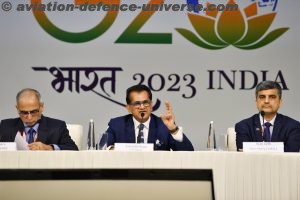
Amitabh Kant, G20 Sherpa: Let me say that when we started India’s presidency, very few people knew about digital public infrastructure and the open source model of it. This has been extensively taken forward by both the finance track and the Sherpa track, in a very vigorous manner. And today India’s digital public infrastructure has been broadly accepted that this is the way to bring in financial inclusion, this is the way to do fast payments, this is the way to drive tech innovation of the future. I think one of our great achievements…somebody had asked about key takeaways, while we are not talking at this stage about achievements but I think one of the key takeaways of India’s presidency is that the world acknowledges India’s technology through the digital public infrastructure, which is a unique model. So its definition, its framework, it’s how we take it forward…all of this has come into discussion during India’s G20 presidency.
Vinay Kwatra, Foreign Secretary: Yeah so just two, I think one on Vishnu’s question about how would the digital public Infrastructure, get expanded, develop strong externalities outside India and also of course within India. I think that is something which remains a very strong, robust and an ongoing effort of the entire Government of India and various departments. There are multiple lines of effort to ensure that DPI not only expands and spreads across various economic ecosystems within India, but also develops a huge value proposition for governance, for transparency, for financial inclusion internationally, and as I said there are several strands and lines of effort which are underway. I think there was a question with regard to the differences of priorities of Global South and the industrial economies. Yes, that is a fact that industrial economies come from a very vastly different economic base, social base, and the Global South comes from a different economic base. But this is not to say that the priorities, interests, and the concerns of the Global South are not relevant in the context of the G20. I think if anything they are perhaps central to the effectiveness, the functioning, and the successful outcome of the G20 modalities. So yes, those are different perspectives of the two respective, I would say, segments of economy, but they both have a very important interface when it comes to the deliberations of the G20. And as I said early on, India and Prime Minister Modi himself have been in the forefront about speaking on the priorities of the Global South, more importantly why and how those priorities could be structured in to the agenda and the discussions of the G20. Thank you.
Arindam Bagchi, Official Spokesperson: Thank you very much for joining us. We are just completely out of time. Thank you to all the members on the dais. Thank you all for joining us here. We will now see you on Sunday for the end of presidency presser. Thank you.
